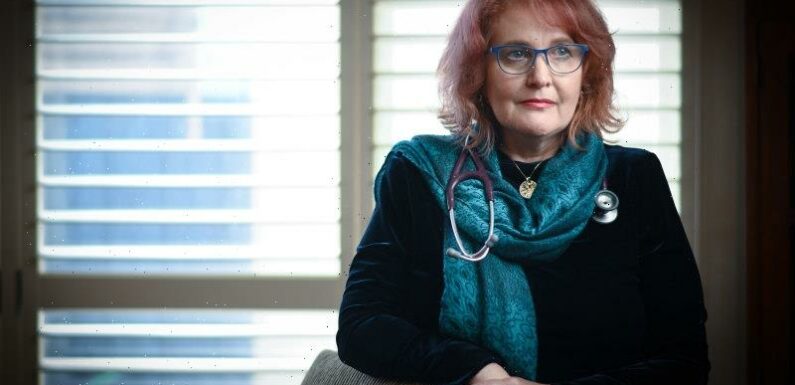
Staying in general practice is financially unsustainable for almost half of the nation’s GPs due to the increasing costs of providing healthcare and the growing numbers of patients with complex conditions.
A new report from the Royal Australian College of General Practitioners surveyed 3219 GPs across Australia and was conducted between April and May this year. It found roughly half of respondents avoided providing certain services – such as mental health consultations – or avoided claiming those rebates for fear of being accused of not complying with Medicare rules.
The Royal Australian College of General Practitioners president Dr Karen Price. Credit:Eddie Jim
Just 3 per cent of GPs surveyed in the annual Health of a Nation report believed the Medicare rebate was enough to cover the cost of providing care and seven in 10 practice owners worried about the short- or long-term viability of their business as they struggled to find and retain doctors.
“Unless things change, more and more practices will face the impossible decision of hiking fees for patients or closing up shop,” college president Dr Karen Price said.
“GPs are well-placed to find other employment. The ball is in the government’s court and action is needed right away. Unless that occurs, the health of the nation will deteriorate.”
The college is pushing the federal government to immediately boost investment in general practice to ensure its long-term survival and continued ability to care for the most vulnerable patients who rely on bulk billing.
“Until that occurs, future doctors will continue to opt for other specialities and more and more GPs will throw their hands in the air and quit,” Price said.
The survey found one in four GPs planned to retire within the next five years (an increase from 18 per cent in 2021), equating to 7500 GPs. Fewer than half of GPs intend to keep practising in 10 years’ time.
More than 40 per cent of GPs are aged 55 or older but one in five GPs under 45 said they planned to leave the profession within 10 years, up from one in 10 in 2017.
A recent Deloitte and Cornerstone Health report predicted Australia would suffer a deficit of 11,517 GPs by 2032 as the average age of the population increases and the number of GPs drops from 30,736 in 2021 to 29,483 in 2032.
Just 13.8 per cent of medical students are choosing to become GPs, down from 16.1 per cent last year, the Medical Deans of Australia and New Zealand’s national data report shows.
“We’re haemorrhaging GPs at all stages of the pipeline,” Price said.
Almost three in four GPs reported experiencing feelings of burnout over the previous 12 months and fewer than half said they would recommend their profession as a career to junior colleagues, the survey found.
“Urgent action is needed to give general practice an immediate restoration of funds lost through the Medicare rebate freeze,” Price said.
Only 82.2 per cent of national medical services were bulk billed in 2021-2022, according to federal government data. That was despite several factors that probably inflate bulk-billing figures, including mandatory bulk-billing for COVID vaccinations.
Medicare GP consultation rebates were frozen in 2013 until 2018 when they rose by 1.6 per cent and were recently increased by 65c to $39.60, which does not keep pace with inflation, let alone the rising cost of providing healthcare, Price said.
“Medicare is rewarding high volume, short consultations, which are not a sustainable way to practice good quality medicine,” she said. “We need to look at longer consultations, and complexity loadings, particularly for aged care, mental health and disability.”
On Tuesday, federal Health Minister Mark Butler said he was “deeply concerned” about the state of general practice.
“After nine years of cuts and neglect to Medicare, particularly a six-year freeze on the Medicare rebate … general practice is in the most parlous state in the almost 40-year history [of Medicare],” he said.
Butler convened the Strengthening Medicare Taskforce – which included the RACGP, Australian Medical Association and other key healthcare and patient advocacy bodies – to guide the government’s $750 million investment in primary care over the next four years. The taskforce is expected to present its recommendations by the end of the year.
Mr Butler said the low proportion of medical graduates choosing general practice was “frankly terrifying”.
“We have a very serious challenge ahead of us to rebuild general practice and to strengthen Medicare,” he said. “I see that as the highest priority [of] the health policy for this government.”
The Health of a Nation report also urged the government to ease the excessive administrative burden of running general practices.
Some 61 per cent of GPs said ensuring they were compliant with Medicare took time away from caring for their patients, and 47 per cent said they either avoided providing certain services or avoided claiming patient rebates out of fear of being found non-compliant with Medicare rules.
“GPs are avoiding claiming for things like mental health consultations even though they’ve done the work,” Price said. The trend was particularly concerning considering mental health issues were the most common reason for patients presenting to their GPs for the sixth consecutive year, the report showed.
The Morning Edition newsletter is our guide to the day’s most important and interesting stories, analysis and insights. Sign up here.
Most Viewed in National
From our partners
Source: Read Full Article
